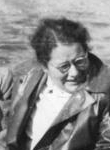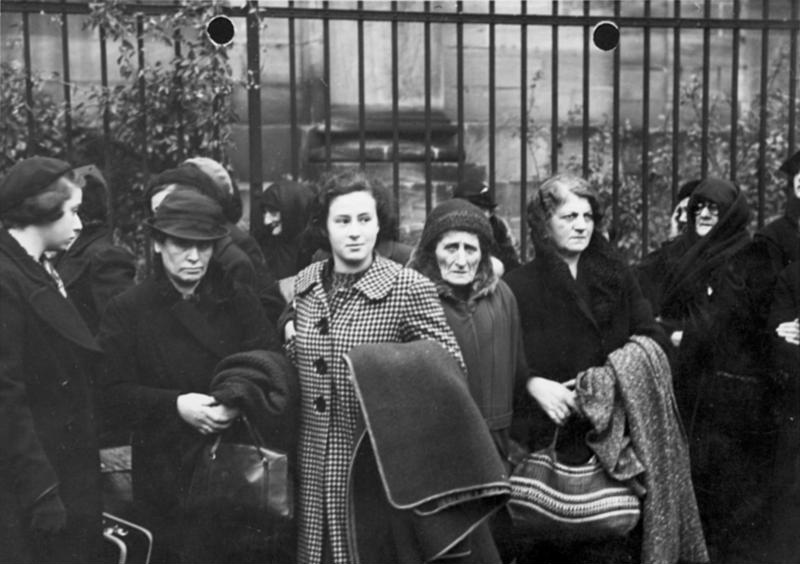|
Margarete Wittkowski
Margarete "Grete" Wittkowski (18 August 1910 – 20 October 1974) was a German economist and politician (KPD / SED). Between 1961 and 1967 she served as deputy chair of the East German Council of Ministers, the only woman ever to hold this post. Between 1967 and 1974, she served as President of the East German National Bank. Life Provenance and early years Margarete Wittkowski was born in Posen. Her father was a businessman: her mother was a pianist. She attended school in Posen till 1926, when the family moved to Berlin. Here, between 1929 and 1932, she studied Social economics (''"Volkswirtschaftslehre"''). Till 1931 she was active in the Zionist Movement, after which, following "discussions with leftist friends" her political energies were increasingly focused on the Communist Party, which she joined in September 1932. Nazi Germany, Swiss exile (1933-1939) In January 1933 the political backdrop was transformed when the Nazi Party took power and converted Germa ... [...More Info...] [...Related Items...] OR: [Wikipedia] [Google] [Baidu] |
Weimar Germany
The Weimar Republic (german: link=no, Weimarer Republik ), officially named the German Reich, was the government of Germany from 1918 to 1933, during which it was a Constitutional republic, constitutional federal republic for the first time in history; hence it is also referred to, and unofficially proclaimed itself, as the German Republic (german: Deutsche Republik, link=no, label=none). The state's informal name is derived from the city of Weimar, which hosted the constituent assembly that established its government. In English, the republic was usually simply called "Germany", with "Weimar Republic" (a term introduced by Adolf Hitler in 1929) not commonly used until the 1930s. Following the devastation of the First World War (1914–1918), Germany was exhausted and sued for peace in desperate circumstances. Awareness of imminent defeat sparked a German Revolution of 1918–1919, revolution, the Abdication of Wilhelm II, abdication of Kaiser Wilhelm II, formal surrender Allie ... [...More Info...] [...Related Items...] OR: [Wikipedia] [Google] [Baidu] |
Basel
, french: link=no, Bâlois(e), it, Basilese , neighboring_municipalities= Allschwil (BL), Hégenheim (FR-68), Binningen (BL), Birsfelden (BL), Bottmingen (BL), Huningue (FR-68), Münchenstein (BL), Muttenz (BL), Reinach (BL), Riehen (BS), Saint-Louis (FR-68), Weil am Rhein (DE-BW) , twintowns = Shanghai, Miami Beach , website = www.bs.ch Basel ( , ), also known as Basle ( ),french: Bâle ; it, Basilea ; rm, label= Sutsilvan, Basileia; other rm, Basilea . is a city in northwestern Switzerland on the river Rhine. Basel is Switzerland's third-most-populous city (after Zürich and Geneva) with about 175,000 inhabitants. The official language of Basel is (the Swiss variety of Standard) German, but the main spoken language is the local Basel German dialect. Basel is commonly considered to be the cultural capital of Switzerland and the city is famous for its many museums, including the Kunstmuseum, which is the first collection of art accessibl ... [...More Info...] [...Related Items...] OR: [Wikipedia] [Google] [Baidu] |
Zürich
Zürich () is the list of cities in Switzerland, largest city in Switzerland and the capital of the canton of Zürich. It is located in north-central Switzerland, at the northwestern tip of Lake Zürich. As of January 2020, the municipality has 434,335 inhabitants, the Urban agglomeration, urban area 1.315 million (2009), and the Zürich metropolitan area 1.83 million (2011). Zürich is a hub for railways, roads, and air traffic. Both Zurich Airport and Zürich Hauptbahnhof, Zürich's main railway station are the largest and busiest in the country. Permanently settled for over 2,000 years, Zürich was founded by the Roman Empire, Romans, who called it '. However, early settlements have been found dating back more than 6,400 years (although this only indicates human presence in the area and not the presence of a town that early). During the Middle Ages, Zürich gained the independent and privileged status of imperial immediacy and, in 1519, became a primary centre of the Protestant ... [...More Info...] [...Related Items...] OR: [Wikipedia] [Google] [Baidu] |
Kristallnacht
() or the Night of Broken Glass, also called the November pogrom(s) (german: Novemberpogrome, ), was a pogrom against Jews carried out by the Nazi Party's (SA) paramilitary and (SS) paramilitary forces along with some participation from the Hitler Youth and German civilians throughout Nazi Germany on 9–10 November 1938. The German authorities looked on without intervening.German Mobs' Vengeance on Jews", ''The Daily Telegraph'', 11 November 1938, cited in The name (literally 'Crystal Night') comes from the shards of broken glass that littered the streets after the windows of Jewish-owned stores, buildings and synagogues were smashed. The pretext for the attacks was the assassination of the German diplomat Ernst vom Rath by Herschel Grynszpan, a 17-year-old German-born Polish Jew living in Paris. Jewish homes, hospitals and schools were ransacked as attackers demolished buildings with sledgehammers. Rioters destroyed 267 synagogues throughout Germany, Austria and the ... [...More Info...] [...Related Items...] OR: [Wikipedia] [Google] [Baidu] |
Political Myth
A political myth is an ideological narrative that is believed by social groups. In 1975, Henry Tudor defined it in the book ''Political Myth''. He said that myths are believed to be true even if they may be false, and they are devices with dramatic constructions used "in order to come to grips with reality". Political myths simply deal with political topics and always use a group of people as the hero or protagonist. In 2001, Christopher G. Flood described a working definition of a political myth as "an ideologically marked narrative which purports to give a true account of a set of past, present, or predicted political events and which is accepted as valid in its essentials by a social group". Examples cited as political myths include Manifest Destiny, The Clash of Civilizations, and national myths. In 1946 Ernst Cassirer recounted political theory in his ''The Myth of the State''. In 1973, T. L. Thorson wrote in the 4th edition of '' A History of Political Theory'': "It is the ... [...More Info...] [...Related Items...] OR: [Wikipedia] [Google] [Baidu] |
Jürgen Kuczynski
Jürgen Kuczynski (; 17 September 1904, Elberfeld – 6 August 1997, Berlin) was a German economist, journalist, and communist. He also provided intelligence to the Soviet Union during World War II. By 1936, Kuczynski had followed his father and other family into exile in England. After being temporarily interned as an enemy alien at the start of World War II, during the war he was recruited by the OSS, the precursor of the CIA, to recruit German communists to be sent to Germany to make contact with resistance groups. He also served in the US Army as a colonel in its Air Force, on a team conducting the Strategic Bombing Survey. At the same time he passed their results "to Soviet intelligence." In 1942 he recruited Klaus Fuchs to Soviet intelligence and introduced the physicist to his sister Ursula Kuczynski (aka Ruth Werner), who had become a "star agent" of the Soviet Union. She acted as Fuchs's courier for four years, but as far as is known she was never placed under surveilla ... [...More Info...] [...Related Items...] OR: [Wikipedia] [Google] [Baidu] |
Herman Schmalenbach
Herman Schmalenbach (15 November 1885 – 3 November 1950) was a German philosopher who refined the concepts of Gemeinschaft and Bund. Biography He was born on 15 November 1885 in Breckerfeld, Germany, his brother was Eugen Schmalenbach. He studied in Jena, Berlin and Munich, and he received his doctorate in 1910 at Jena. From 1916 to 1917 he taught at a reform school in Ilbeshausen-Hochwaldhausen. In Göttingen from 1920 to 1923 he was an associate professor. He also taught in 1928 at the Leibniz University Hannover. From 1931 he started at the University of Basel, founded and worked there until his death on 3 November 1950 in Basel, Switzerland , french: link=no, Bâlois(e), it, Basilese , neighboring_municipalities= Allschwil (BL), Hégenheim (FR-68), Binningen (BL), Birsfelden (BL), Bottmingen (BL), Huningue (FR-68), Münchenstein (BL), Muttenz (BL), Reinach (BL), Riehen (BS), .... His son was the art historian Werner Schmalenbach (1920–2010). References {{ ... [...More Info...] [...Related Items...] OR: [Wikipedia] [Google] [Baidu] |
Edgar Salin
Edgar Bernhard Jacques Salin (10 February 1892 – 17 May 1974) was a German economist, historian, and translator. Born on 10 February 1892 in Frankfurt, he studied political economy and jurisprudence, completing his PhD at Heidelberg University in 1913 with a thesis on the economic development of Alaska under the supervision of Alfred Weber. After habilitating at Heidelberg in 1920 with a monograph on the political thought of Plato, Salin taught there and at Kiel before taking up a position as Professor of National Economy at the University of Basel in 1927, which he held until 1962. He served as Chancellor of Basel University. He founded the journal '' Kyklos'' at Basel in 1947. Salin's economic theory integrated influences from John Maynard Keynes, Karl Marx, and Friedrich List. He supported far-reaching economic interventionism. In the 1920s he was associated with the poet Stefan George and his circle, and George's aestheticist outlook influenced Salin throughout ... [...More Info...] [...Related Items...] OR: [Wikipedia] [Google] [Baidu] |
University Of Basel
The University of Basel (Latin: ''Universitas Basiliensis'', German: ''Universität Basel'') is a university in Basel, Switzerland. Founded on 4 April 1460, it is Switzerland's oldest university and among the world's oldest surviving universities. The university is traditionally counted among the leading institutions of higher learning in the country. The associated Basel University Library is the largest and among the most important libraries in Switzerland. The university hosts the faculties of theology, law, medicine, humanities and social sciences, science, psychology, and business and economics, as well as numerous cross-disciplinary subjects and institutes, such as the Biozentrum for biomedical research and the Institute for European Global Studies. In 2020, the university had 13,139 students and 378 professors. International students accounted for 27 percent of the student body. In its over 500-year history, the university has been home to Erasmus of Rotterdam, Parac ... [...More Info...] [...Related Items...] OR: [Wikipedia] [Google] [Baidu] |
Switzerland
). Swiss law does not designate a ''capital'' as such, but the federal parliament and government are installed in Bern, while other federal institutions, such as the federal courts, are in other cities (Bellinzona, Lausanne, Luzern, Neuchâtel, St. Gallen a.o.). , coordinates = , largest_city = Zürich , official_languages = , englishmotto = "One for all, all for one" , religion_year = 2020 , religion_ref = , religion = , demonym = , german: Schweizer/Schweizerin, french: Suisse/Suissesse, it, svizzero/svizzera or , rm, Svizzer/Svizra , government_type = Federalism, Federal assembly-independent Directorial system, directorial republic with elements of a direct democracy , leader_title1 = Federal Council (Switzerland), Federal Council , leader_name1 = , leader_title2 = , leader_name2 = Walter Thurnherr , legislature = Fe ... [...More Info...] [...Related Items...] OR: [Wikipedia] [Google] [Baidu] |



